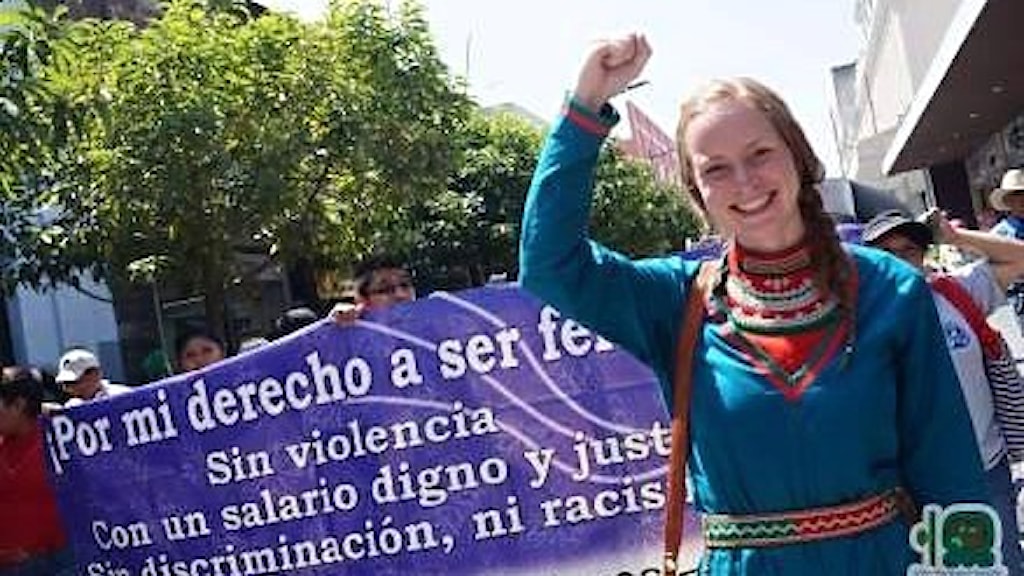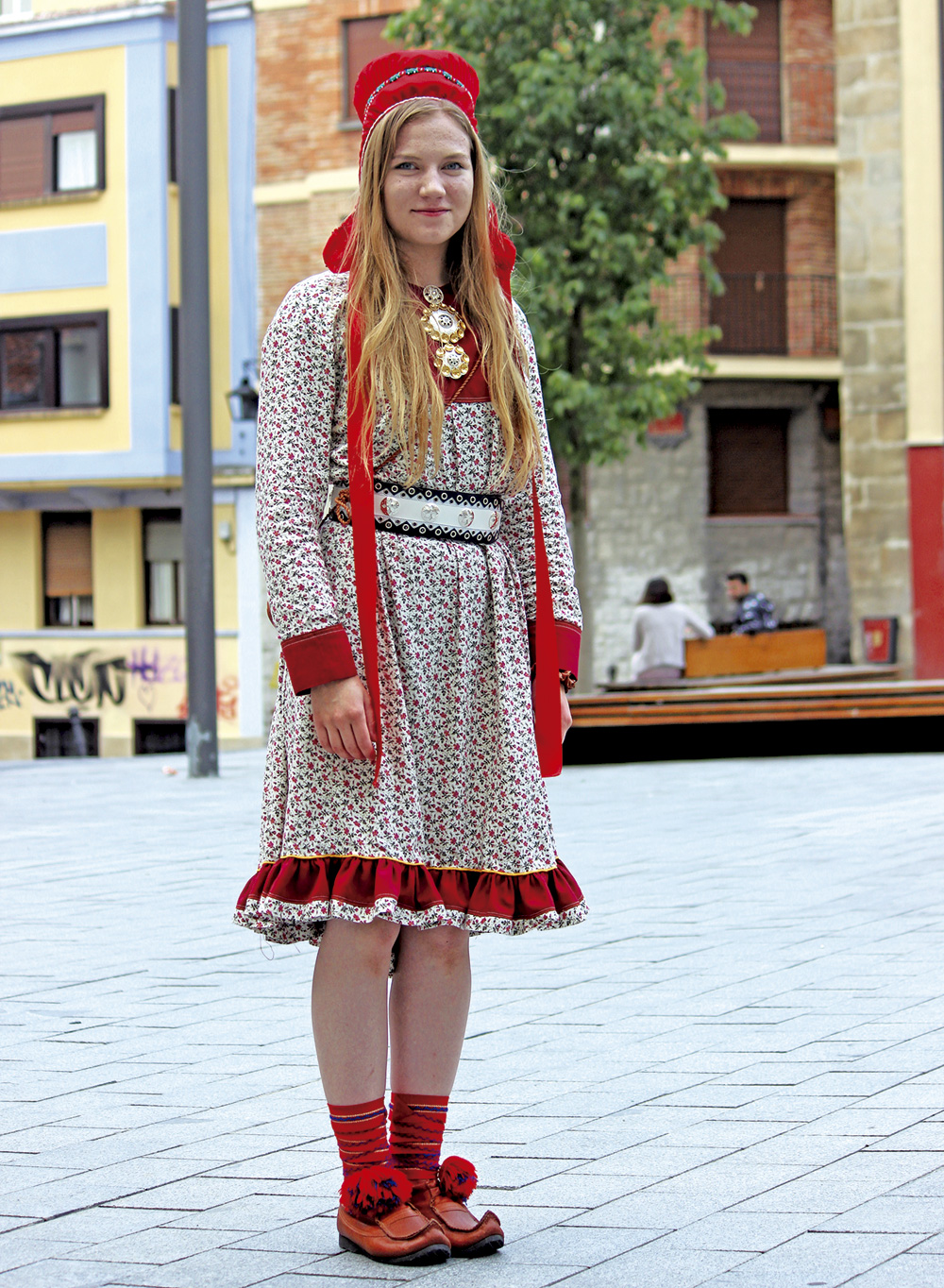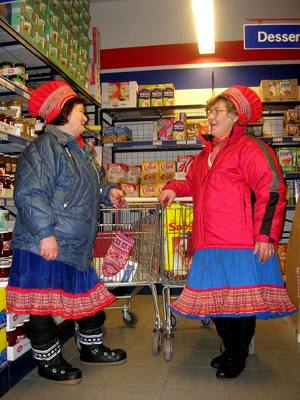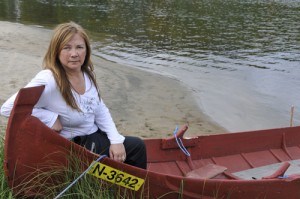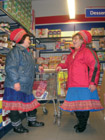"Singing in Sami is a political decision"
- The musician Mari Boine will probably be the most popular face of Northern European Sami culture. The only one who has publicly shown his teeth to the Norwegian Prime Minister for years. What was initially seen as bad in his village for singing in his own language is now admired by many. The concert will be held in Bilbao on 15 October.
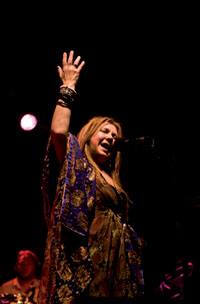
You were born in 1956. How was your childhood?
I was born in northern Norway in the village of Gamehhisnjarga, near the border with Finland. I remember a lot of freedom, wide spaces everywhere. We used to fish salmon, collect blackberries... We didn’t have a car, but a small boat because we lived near a river. In winter, we used the horse to go from one side to the other in snowy landscapes. It could be said that we lived like in a story. But along with that, we had a lot of rigor, because our parents were very religious and even though they were Sami, they saw with bad eyes many things related to our habits.
Did they speak Sami?
At home we always spoke Sami, that was our language. His grandparents barely knew a word of Norwegian, and his parents never learned it very well. So when they started out in Norwegian outside the house, I was embarrassed.
What was it like for a Sami child to go to a Norwegian school?
In the interior the school was not as hard as on the coast. Even though all the schools were in Norwegian, we could speak Sami. We were all Sami, with the exception of the Norwegian children of some teachers, at most a couple, but I don’t remember much of that era. The school on the coast was tougher and the system itself was destined for the Sami to lose their Sami status and become Norwegian. Our language was forbidden, and those who spoke Sami were beaten. They also taught only Norwegian history. It was a very successful planning and in a short time people managed to forget their past. Many parents suffered so much during school that they did not explain anything to the children about their origins. A large percentage became Norwegian.
You also wanted to be ashamed of your Sami character and become a Norwegian in your youth.
Oh, yeah, yeah. This was the effect of the school. They taught us to underestimate the Sami culture. “If you want to be someone, you have to be Norwegian” was the idea we had in mind when we left school. We were Sami and we spoke Norwegian.
You didn't teach your child your language.
When I had my first child I spoke to him in Norwegian and without feeling anything strange. I was totally stubborn. The second one, yes. And the first one later, but I taught him.
When and how did you turn this idea around?
When I started teaching, I started reading my story. These were hot years, because for the first time we began to fight politically in Saapmi against the dam that the Norwegian Government wanted to make on the Alta River. There was a lot of talk about us in the media and for the first time I started to ask myself: “Why are we ashamed to be Sami?” I started to change with that question.
Did music play a role in the process?
Oh, yeah, yeah. I used to be very shy. As I began to sing, I began to feel more secure in my life. It was like medicine, especially when I started singing in my own language. Music has been therapy for me for 15 years.
Where did your passion for music come from?
A teacher discovered me and taught me how to play the piano. Our father was very tough and wouldn’t let me go to concerts or theaters, he was so strict in the beliefs of the Church. Finally, this teacher went to talk to his father to ask him to let his daughter go to concerts.
How did people respond when they heard a woman sing in Sami?
I remember a man who came to me once, about 50 years old. The poor man was always devoted to drinking. When he heard that song I had done about school humiliations, he came to me and said, “You’re singing about me.” That’s when I realized that I began to reflect the feelings of many people and that it was important for us to express them. My parents didn't want me to sing these lyrics, they wanted religious songs. But my songs were very politically committed, and some even stopped talking to me.
Is that Samie?
Yes, especially the Samis. “Why don’t you sing in Norwegian?” they said. This is the gravity of the situation, with the Sami reproaching me that I had to sing in Norwegian.
How did you manage to turn opposing opinions into supporters?
My voice was like a gun, I opened my hearts. In any case, from the beginning it was clear to me that I had to go abroad, to succeed there, then return home and be accepted. That's what I did. However, I have always had the support of a group that has been gradually increasing. The success came 20 years after its beginnings in the world of music.
Now you leave the political lyrics and make the music more spiritual. Is it a deliberate decision?
Yes, because I have expressed my political opinion very clearly, and these songs have remained there for those who want to hear them. I can't be expressing my disagreement over and over again. Everyone knows what I think of the samion situation. Now I try to find music associated with the shamanism of our ancestors. This has a greater impact than singing political songs. Singing in the Sami language is a political attitude and doing a song that exemplifies shamanism is also a political attitude. More and more people in Norway understand what I am doing and more people are becoming aware of the situation we Samians are living in. I won several awards last year and I feel very respected.
In your music the drum has a lot of strength.
The missionaries who came in the name of Christianity spread among the population that the drums made the sound of the devil, and they really managed to spread the message to the point that the instrument that was so deeply rooted in the past almost disappeared. But when I started making music, I told myself that if I was really going to reflect a true samion culture, I had to learn to use the sound of drums. This decision was very controversial at the time, as Christianity had completely cleansed the minds of the Sami. They thought the traditional songs belonged to the devil and, for example, my mother was very upset when I started using the drum in some songs. That's why I'm saying it's really political to use it. “I don’t want to believe your lies, you’ve cleared my people’s minds, but I make this music trying to prove that what you say is a lie,” is the way I say it. The use of the drum in songs is stronger than asking the Norwegian Government to respect our culture.
“I feel like I have one leg in the old world and one leg in the modern world,” you said. Isn't that wonderful?
Well, now it is. When I was ashamed of my culture – because I didn’t even know what it was – then it was hard because I wanted to be part of the modern world. Today, I feel strong because I have the keys to go to different cultures. I’m proud of my culture, but I’m also proud of Western culture because it has taught me so much.
You use South American instruments, African drums, you sing in Sami... You look like the voice of the oppressed.
I know what it's like to be oppressed. I am ashamed of my culture and there is nothing worse than that. When people can't breathe like they are, they're crushed. That is why I try to show solidarity with people in the same situation.
You repeatedly challenged the Norwegian Prime Minister to apologize to the Sami people for all the damage done. In 1995, he finally requested it. How do you remember that moment?
It was a victory. When I look back, I say to myself: “Where did I get all that energy?” I was talking with my heart. When I learned the history of our country, I realized how prepotent the Norwegians had been with us and felt the need to address the Prime Minister publicly.
In Scandinavia many people are fighting for the rights of the peoples of South America, but the message was clear: “Look at the back garden!” It was very uncomfortable for the Norwegians, who filled their mouths with messages of solidarity in front of the world and suddenly a Sami woman put the mirror in front of the extremes and said: “Look what you’re doing up there.” But I think we've been educating together, all together.
And how do you feel as an ambassador of such an ancient culture in this globalized world?
Very proud of you. Our culture is so old. I say to the Norwegians: “You don’t have to take care of us because we feel sorry for you, but because the culture that is also yours is rich.” That of the Basques, that of the South Americans... is a treasure that we have managed to maintain in some way, for thousands of years. There is wisdom in our tongues. I dream of the day when even the biggest ones will value the little old cultures.
On October 15th you will be giving a concert in Bilbao. It is the second concert in a short time in the...
You have suffered the same story that I am telling, and you know what I am talking about. When I lived in Norway and didn’t know there were people in similar situations all over the world, it was harder to fight. But when you connect with other cultures, with other people, life is easier. That is why it is essential to get to know each other and exchange experiences between cultures.
Are you satisfied with the state of the current Sami culture?
Sometimes I’m pessimistic when they put into practice the whole machinery of Anglo-American culture, commercial and materialistic culture. But other times I force myself to look at the small things. My nephew speaks Sami, which is very nice. I want to keep looking at the positive things until I die, I don't want to die before I die.
30 urteren ondoren, Gallivareko (Suedia) tribunal batek Zirkulu Polarrean dagoen Girjaseko sami herri indigenari eman dio beraien herrialdean arrantzatzeko eta ehizatzeko eskubidea. Garan irakur daitekeenez, 1993. urtean kendu zieten eskubidea berreskuratu du komunitateak. Dena... [+]
Suedia iparraldean bizi diren samiak burdina ustiatzeko ireki nahi duten meategi baten aurka ari dira borrokan. Atzo 50 pertsonaz osatutako protesta desegin zuen poliziak eta zortzi atxilotu zituen.
Duela urte asko, samien herri indigena nahi bezala bizi zen eskandinaviar penintsularen iparraldean. Naturarekin bat, bizia elur-oreinen zaintza eta arrantzaren inguruan egiten zuten gehienbat. Lurrak emandakoari ahalik eta probetxurik gehien atereaz, beren sinesmenekin lasai... [+]
Mari Boine artista sami ezagun eta errespetatuena da. Samiak Norvegia, Suedia, Finlandia eta Errusia iparraldean bizi diren indigenak dira, eta diskriminazio garai zaharrak atzean utzi badituzte ere, nahikoa lan badute euren hizkuntzari eusten (egun, datu zehatzik ez bada ere,... [+]
Duela urte asko, samien herri indigena nahi bezala bizi zen eskandinaviar penintsularen iparraldean. Naturarekin bat, bizia elur-oreinen zaintza eta arrantzaren inguruan egiten zuten gehienbat. Lurrak emandakoari ahalik eta probetxurik gehien atereaz, beren sinesmenekin lasai... [+]












